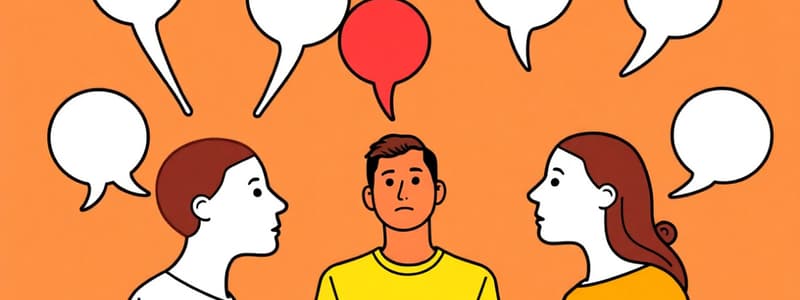Podcast
Questions and Answers
Which of the following best exemplifies illusory correlation?
Which of the following best exemplifies illusory correlation?
- Believing that wearing a lucky shirt will guarantee a win for your sports team. (correct)
- Accurately predicting the outcome of a coin flip multiple times in a row.
- Recognizing the actual correlation between exercise and improved health.
- Understanding that studying hard generally leads to better grades.
According to the principles of regression toward the mean, what is the most likely outcome for a student who scores exceptionally low on their first exam?
According to the principles of regression toward the mean, what is the most likely outcome for a student who scores exceptionally low on their first exam?
- They will perform even worse on the next exam.
- They will perform about the same on the next exam.
- They will perform closer to their average performance on the next exam. (correct)
- They will perform exceptionally well on the next exam as a form of compensation.
How does mood most significantly influence our judgments according to the information presented?
How does mood most significantly influence our judgments according to the information presented?
- Mood has no impact on our judgments; we remain objective regardless.
- Positive moods lead to negative judgements, and negative moods lead to positive judgements.
- Positive moods lead to judging things positively, while negative moods lead to judging things negatively. (correct)
- Mood only affects judgments about ourselves, not about external situations or people.
What is the most effective way to challenge belief perseverance, according to the content?
What is the most effective way to challenge belief perseverance, according to the content?
According to the 'misinformation effect,' how can memories be altered?
According to the 'misinformation effect,' how can memories be altered?
What does the 'fundamental attribution error' primarily lead individuals to do?
What does the 'fundamental attribution error' primarily lead individuals to do?
How does self-serving bias relate to the fundamental attribution error?
How does self-serving bias relate to the fundamental attribution error?
In attribution theory, what does 'consensus' refer to?
In attribution theory, what does 'consensus' refer to?
Priming can influence our perceptions in various ways. Which of the following statements accurately describes how priming operates?
Priming can influence our perceptions in various ways. Which of the following statements accurately describes how priming operates?
Automatic processing and controlled processing are two modes of thinking. What distinguishes automatic processing from controlled processing?
Automatic processing and controlled processing are two modes of thinking. What distinguishes automatic processing from controlled processing?
Overconfidence is a common cognitive bias. Which of the following statements best describes the relationship between competence and overconfidence?
Overconfidence is a common cognitive bias. Which of the following statements best describes the relationship between competence and overconfidence?
Confirmation bias can significantly impact our beliefs. How does confirmation bias influence our perception and interpretation of new information?
Confirmation bias can significantly impact our beliefs. How does confirmation bias influence our perception and interpretation of new information?
Heuristics are mental shortcuts that can aid in decision-making. How does the representativeness heuristic influence our judgments?
Heuristics are mental shortcuts that can aid in decision-making. How does the representativeness heuristic influence our judgments?
The availability heuristic can lead to biased judgments. In what way does the availability heuristic affect our perception of event frequency?
The availability heuristic can lead to biased judgments. In what way does the availability heuristic affect our perception of event frequency?
Counterfactual thinking involves imagining alternative scenarios and outcomes. How does counterfactual thinking typically affect individuals who narrowly miss achieving a goal, such as finishing in second place?
Counterfactual thinking involves imagining alternative scenarios and outcomes. How does counterfactual thinking typically affect individuals who narrowly miss achieving a goal, such as finishing in second place?
Reducing overconfidence is essential for accurate judgment. Which of the following is a proven strategy for reducing overconfidence in one's judgments?
Reducing overconfidence is essential for accurate judgment. Which of the following is a proven strategy for reducing overconfidence in one's judgments?
Flashcards
Priming
Priming
The awakening or activating of certain associations in memory, influencing how we perceive things.
Controlled Processing
Controlled Processing
Reflective, deliberate, and conscious processing of information, involving logic and analysis.
Automatic Processing
Automatic Processing
Impulsive, effortless, and unconscious processing of information, relying on schemas and emotional reactions.
Heuristics
Heuristics
Signup and view all the flashcards
Overconfidence
Overconfidence
Signup and view all the flashcards
Confirmation Bias
Confirmation Bias
Signup and view all the flashcards
Representativeness Heuristic
Representativeness Heuristic
Signup and view all the flashcards
Availability Heuristic
Availability Heuristic
Signup and view all the flashcards
Illusory Correlation
Illusory Correlation
Signup and view all the flashcards
Illusion of Control
Illusion of Control
Signup and view all the flashcards
Regression Towards the Mean
Regression Towards the Mean
Signup and view all the flashcards
Mood Effects on Judgement
Mood Effects on Judgement
Signup and view all the flashcards
Influence of Current Feelings on Past Memories
Influence of Current Feelings on Past Memories
Signup and view all the flashcards
Misinformation Effect
Misinformation Effect
Signup and view all the flashcards
Attribution Theory
Attribution Theory
Signup and view all the flashcards
Fundamental Attribution Error
Fundamental Attribution Error
Signup and view all the flashcards
Study Notes
Social Judgments and Bias
- People respond to their perception of reality
- People are susceptible to overt and subtle influences
- One of these influences is priming
Priming
- Priming is the awakening or activating of certain associations
- Priming prepares us to view things in a particular way
- Priming can be fairly obvious
- Priming cues can be subtle, even unconscious and subliminal
Social Thinking
- Two types of processing exist: Controlled and Automatic
Controlled Processing
- The controlled processing is reflective, deliberate, and conscious
- Involves logic, analysis, and deliberate recall
Automatic Processing
- The automatic processing is impulsive, effortless, and unconscious
- Involves schemas, emotional reactions, and expertise
- Automatic processing does much more work
- People remember and know more than they realize
Automatic Errors
- Most thinking is automatic
- Automatic thinking is prone to significant errors
- Overconfidence, heuristics, illusory thinking and mood effects are all examples of automatic errors
Overconfidence
- People tend to have too much confidence in their own judgments and abilities
- The more incompetent someone is, the more overconfident they tend to be
- This only applies to relatively easy tasks
Why Overconfidence?
- People tend to recall being wrong as being almost right
- Confirmation bias makes people eager to verify our beliefs, but discount evidence against them
- Confirmation bias helps keep self-images and worldviews stable, overconfidence can also make people unable to admit when they are wrong
Reducing Overconfidence
- Three proven ways to reduce overconfidence: prompt feedback for being incorrect, unpacking information into their components, and forcing people to think of at least one way that their answer could be wrong
Heuristics
-
Representativeness involves judging something by how closely it resembles a mental representation
-
Saves time and effort but limits individual differences.
-
Nothing is ever 100% representative of any group
-
Availability involves easily recalling something, which makes it seem more likely
-
The more someone hears something, the more believable it becomes
-
Examples include big, emotional, or unusual events
-
Counterfactual thinking involves what might have been
-
Second place finishers tend to feel worse than third place finishers
-
The narrower the miss, the more intense counterfactual thinking is
-
Counterfactual thinking can cause people to second-guess themselves or mistrust information
Illusory Thinking
- Illusory correlation involves thinking two things are related when they are not
- Illusion of control involves the idea that chance-based events are within our control
- Regression towards the mean involves things eventually ending up being average, performing well on a test means individuals are likely to do worse on the next test, and vice versa
Mood Effects
- When people are happy, they tend to judge things positively
- When upset, people tend to judge things negatively
- People are completely unaware of this effect
Perception and the World
- People on two sides of a conflict will see the same news reports as biased against their side
- People are far more accepting of evidence that supports their side and critical of evidence against it
- People tend to attach traits to those who mentions them frequently
Belief Perseverance
- Once someone has a belief, it is very hard to break it, even in the face of strong evidence against it
- Individuals hear and form beliefs based on information
- People eventually come up with an explanation for why their belief is true
- Even if the original information is discredited, the point remains
- Best relief is to force someone to think through their belief
The Illusion of Memory
- Memories are not exact copies of events
- Current feelings impact past memories
- The misinformation effect is when given incorrect information about a past event, it can be incorporated into memories
- People tend to insist that they have always believed something or held an attitude, even when they have not
Judging Others – Attribution Theory
- Attribution theory asks: is a person's behavior guided more by their personal characteristics or the situation?
- People are eager to infer traits based on as little as one observation
- Spontaneous trait inference is less common in collectivist Asians
- This comes down to 3 different components: Consistency, Distinctiveness, and Consensus
- People ask themselves these three questions:
- Does the person usually act this way?
- Does the person behave differently in this situation than in others?
- Do other people behave the same way in this situation?
Fundamental Attribution Error
The fundamental attribution error involves a tendency to give too much weight to disposition and not enough to the situation
- People assume traits to others that they may not have
- On the other hand, people use the situation to excuse their own behavior
Why Fundamental Attribution Error?
- Partly results from self-serving bias
- Likely influenced by how we perceive ourselves and others
- When someone acts, the environment takes up their attention, and we assume others act in the same way
- However, there are too many factors involved, like our own changes with different situations
Culture
- People everywhere are prone to the "fundamental" attribution error
- Collectivists or Easterners are somewhat less prone to it.
In Sum
- These biases and tendencies exist because they help as well as harm
- People cannot individually analyze every single person and situation
- Understand that our judgement is imperfect
- Always catch yourself when you start judging
- Call out these errors when they occur in others
Studying That Suits You
Use AI to generate personalized quizzes and flashcards to suit your learning preferences.




